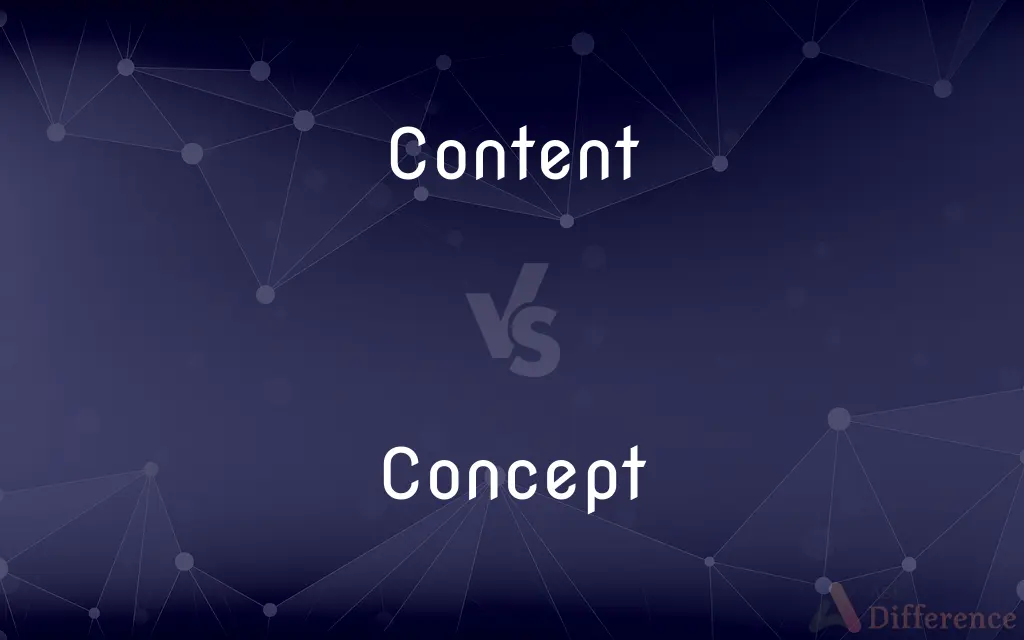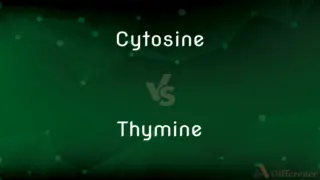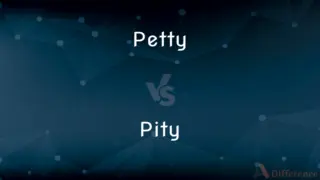Content vs. Concept — What's the Difference?
Edited by Tayyaba Rehman — By Fiza Rafique — Updated on March 6, 2024
Content refers to the information or material within something, whereas concept is an abstract idea or a general notion.

Difference Between Content and Concept
Table of Contents
ADVERTISEMENT
Key Differences
Content encompasses the tangible and detailed material found within a book, website, course, or any form of communication. It includes text, images, videos, and any other medium used to convey information or entertainment. Concepts, on the other hand, are the foundational ideas or principles that underlie content. They represent the overarching themes, theories, or philosophies that inform or guide the creation of content.
While content is the actual substance that audiences consume, such as the chapters of a book or the videos in a course, concepts are more about the underlying ideas or messages intended to be communicated through that content. For instance, a science textbook's content includes the chapters on biology, chemistry, physics, etc., whereas the concept might involve fostering a comprehensive understanding of the natural world.
The creation process for both involves different stages of development. Content creation focuses on producing and compiling information in various formats, guided by a concept. Concept development, however, is about ideating, refining, and establishing the fundamental ideas or objectives that the content aims to express or achieve.
The value of content lies in its ability to inform, educate, entertain, or persuade an audience with specific, organized information. The significance of a concept, however, is in its capacity to inspire, guide, and shape the creation and interpretation of content, offering a lens through which the content can be understood and appreciated.
Both content and concept play crucial roles in effective communication and learning. Content delivers the message, while the concept ensures the message is cohesive, purposeful, and impactful, aligning with broader goals or themes.
ADVERTISEMENT
Comparison Chart
Definition
The information or material within something.
An abstract idea or a general notion.
Examples
Text, images, videos in a book or website.
Themes, theories, philosophies behind content.
Purpose
To inform, educate, entertain, or persuade.
To inspire, guide, and shape content creation.
Creation Process
Producing and compiling information.
Ideating, refining, establishing fundamental ideas.
Role in Communication
Delivers specific, organized information.
Ensures cohesiveness and purpose in the message.
Compare with Definitions
Content
Everything that is included in a collection.
The museum's content spans several centuries of art history.
Concept
A general notion or idea.
The designer explained the concept behind the innovative architecture.
Content
Information made available by a website or other electronic medium.
The website's content is updated weekly to keep visitors engaged.
Concept
A plan or intention; a conception.
The marketing team developed a new concept for the advertising campaign.
Content
The topics or matter treated in a written work.
The book's content covers all the basics of cooking.
Concept
An abstract idea representing the fundamental characteristics of what it represents.
The concept of freedom is vital to the novel's theme.
Content
The amount of a particular constituent occurring in a substance.
The content of protein in this food is high.
Concept
An abstract or generic idea generalized from particular instances.
The concept of biodiversity is crucial for understanding ecosystem health.
Content
The substance or material dealt with in a speech, literary work, etc., as distinct from its form or style.
The content of the webinar was highly informative and engaging.
Concept
The underlying idea or theory that forms the basis for something.
The artist's work is based on the concept of impermanence.
Content
Often contents Something contained, as in a receptacle
The contents of my desk drawer.
The contents of an aerosol can.
Concept
Concepts are defined as abstract ideas or general notions that occur in the mind, in speech, or in thought. They are understood to be the fundamental building blocks of thoughts and beliefs.
Content
The individual items or topics that are dealt with in a publication or document
A table of contents.
Concept
An abstract idea
Structuralism is a difficult concept
The concept of justice
Content
The material, including text and images, that constitutes a publication or document.
Concept
A general idea or understanding of something
The concept of inertia.
The concept of free will.
Content
Information, such as text, video, and sound, usually as contrasted with its format of presentation
A television producer looking for content that was more entertaining.
Concept
A plan or original idea
The original concept was for a building with 12 floors.
Concept
A unifying idea or theme, especially for a product or service
A new restaurant concept.
Concept
An abstract general conception; a notion; a universal.
The words conception, concept, notion, should be limited to the thought of what can not be represented in the imagination; as, the thought suggested by a general term.
Concept
An abstract or general idea inferred or derived from specific instances
Common Curiosities
How do concepts influence the creation of content?
Concepts guide the direction, focus, and message of content creation, ensuring that the material aligns with overarching ideas or goals.
What is the primary difference between content and concept?
Content refers to the actual material or information provided, whereas concept is the underlying idea or principle that guides the creation or interpretation of that content.
Why is understanding the concept important for interpreting content?
Understanding the concept helps in grasping the deeper meanings, intentions, or implications of content, beyond its surface-level information.
Are concepts more important than content?
Concepts and content are equally important but serve different roles; concepts provide direction and depth, while content delivers the actual information or experience.
Can content exist without a concept?
While content can technically exist without a concept, it may lack coherence, purpose, or depth without a guiding idea or theme.
How do content creators balance between content and concept?
Content creators balance by ensuring that their material aligns with the underlying concept, enhancing coherence and impact, while also focusing on quality and relevance of the content itself.
Can content shape the development of new concepts?
Yes, content can lead to the development of new concepts, especially as creators and audiences interact with material in novel ways, generating fresh insights and ideas.
How does one evaluate the effectiveness of a concept in content?
The effectiveness of a concept can be evaluated by its clarity, how well it guides and unifies the content, and its ability to engage and resonate with the audience.
How can one develop a strong concept for content creation?
Developing a strong concept involves research, brainstorming, refining ideas, and aligning them with the intended message, audience, and objectives.
How do content and concept interact in digital media?
In digital media, the concept guides the creation and curation of content, ensuring that it engages, informs, or entertains the audience in a meaningful way.
Can the same content be used to express different concepts?
Yes, the same content can be repurposed or interpreted in various ways to express different concepts, depending on the context and audience.
What role do concepts play in marketing?
In marketing, concepts are used to create a unified and compelling message that guides the creation of promotional content, aimed at resonating with the target audience.
How do trends affect the relationship between content and concept?
Trends can influence both the creation of content and the development of concepts, as creators aim to stay relevant and resonate with current interests and values.
How can educators use content and concept together effectively?
Educators can use concepts to frame lessons, making content more engaging and understandable by connecting it with broader ideas or themes.
What is the impact of a well-defined concept on content engagement?
A well-defined concept can significantly enhance content engagement by providing depth, meaning, and relevance, making the content more compelling and memorable.
Share Your Discovery

Previous Comparison
Cytosine vs. Thymine
Next Comparison
Petty vs. PityAuthor Spotlight
Written by
Fiza RafiqueFiza Rafique is a skilled content writer at AskDifference.com, where she meticulously refines and enhances written pieces. Drawing from her vast editorial expertise, Fiza ensures clarity, accuracy, and precision in every article. Passionate about language, she continually seeks to elevate the quality of content for readers worldwide.
Edited by
Tayyaba RehmanTayyaba Rehman is a distinguished writer, currently serving as a primary contributor to askdifference.com. As a researcher in semantics and etymology, Tayyaba's passion for the complexity of languages and their distinctions has found a perfect home on the platform. Tayyaba delves into the intricacies of language, distinguishing between commonly confused words and phrases, thereby providing clarity for readers worldwide.
















































